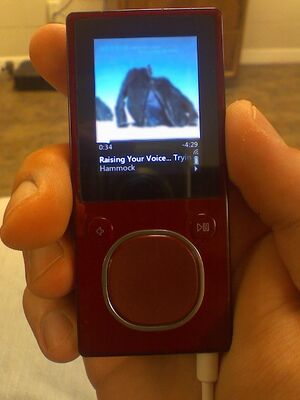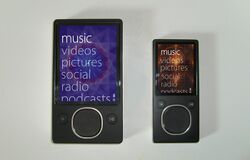Engineering:Zune 4, 8, 16
 | |
 | |
| Manufacturer | Microsoft |
|---|---|
| Type | Portable media player |
| Operating system | Microsoft Windows |
| Storage | 4 / 8 / 16 GB flash memory |
| Display | 320 x 240 resolution, 1.8 in. diagonal, scratch resistant glass |
| Input | Zune Pad |
| Touchpad | Squircle-shaped Zune Pad |
| Connectivity | Wi-Fi, USB, Microsoft PixelSense (Wireless, formerly Surface) |
| Power | 3.7 V 720 mAh Internal rechargeable non-removable lithium-ion polymer battery |
| Current firmware | 3.30 |
| Dimensions | 3.6 x 1.6 x 0.33 in. (91.5 x 41.4 x 8.5 mm) |
| Mass | 1.7 oz. |
| Predecessor | Zune 30 |
| Successor | Zune HD |
| Related articles | Zune 80, 120 |
The Zune 4, Zune 8, and Zune 16 are second-generation models of the Zune lineup, they were first announced on October 2, 2007 and released on November 13, 2007 in the United States and June 13, 2008 in Canada. They are flash memory-based players meant to compete with the iPod Nano and the Sansa Fuze, both smaller and cheaper than the three hard drive-based Zune devices, the Zune 30, Zune 80, and Zune 120. They feature music, video, and podcast support, and come with Wi-Fi and FM Radio.
Overview
The D-pad of the original Zune has been replaced by the Zune pad, which allows for touch-sensitive controls in addition to 5-way clicking. Wi-Fi is used for wireless synchronization and for sharing photos, podcasts, and music with other Zunes, although shared songs may only be played three times by the receiving Zune. The FM Radio includes RBDS support for displaying song and station metadata, but does not support HD-Radio. The flash Zune models also feature scratch resistant glass screens, similar to the screens used on the v2 Zunes.
| Zune 4 | Zune 8 | Zune 16 | |
|---|---|---|---|
| Flash storage | 4 GB | 8 GB | 16 GB |
| Processor | 399 MHz ARM Core Freescale i.MX31L | ||
| RAM | 64MB (16MB available for games) | ||
| Directional pad | Uses a Zune Pad, a "squircle" shaped control featuring touch sensitive controls along with standard direction pad controls | ||
| Suggested retail price | $79.99 USD | $99.99 USD | $159.99 USD |
| Screen | 320x240, 1.8 inches, scratch-resistant glass | ||
| Dimensions | 41.4 x 91.5 x 8.5 mm (1.6 x 3.6 x 0.33-inches) | ||
| Weight | 1.7 oz (47 g) | ||
| Battery life | 28 hours (estimated, audio-only, no Wi-Fi) | ||
Reception

The Zune 4, 8, and 16 have gotten generally positive reception. Positives and negatives mimic those of the Zune 80 and 120, as the 4, 8, and 16 are very similar devices in a smaller package: the Wi-Fi, user interface, and excellent sound quality are praised.[1] Some reviews have mentioned the lack of TV shows in the Zune Marketplace, it has since been updated with the ability to purchase and rent TV shows and movies.[2]
Specifications
The specifications as listed by the official web site of the Zune:[3]
- 1.8-inch color display with 320×240 resolution
- 4, 8, and 16 GB flash memory options
- CPU: 399 MHz ARM Core Freescale i.MX31L
- RAM: 64 MB
- 802.11b/g Wi-Fi compatible with open, WEP, WPA, and WPA2 authentication modes and WEP 64-bit and 128-bit, TKIP, and AES encryption modes[3]
- Built in Li-Ion rechargeable with up to 24 hours of audio playback (wireless off) and video, up to 4 hours[4]
- Size: 41.4 mm x 91.5 mm x 8.5 mm
- Weight: 1.7 ounces (47 grams)
- FM radio tuner
- Audio support:[3]
- CBR and VBR audio, up to 48 kHz sample rate:
- WMA Standard Up to 320 kbit/s
- WMA Pro stereo up to 384 kbit/s
- WMA Lossless stereo up to 384 kbit/s
- Advanced Audio Coding (AAC)(.mp4, .m4a, .m4b, .mov) up to 320 kbit/s
- MP3 (.mp3): up to 320 kbit/s
- CBR and VBR audio, up to 48 kHz sample rate:
- Video Support:[3]
- Picture Support:[3]
- JPEG (.jpg)
References
- ↑ Bell, Donald (2009-08-18). "CNET Review". CNET. CBS Interactive. https://reviews.cnet.com/mp3-players/zune-second-generation-8gb/4505-6490_7-32638985.html?tag=prod.txt.3.
- ↑ "Zune Videos". Zune. Microsoft. http://www.zune.net/en-US/marketplace/videos.htm.
- ↑ 3.0 3.1 3.2 3.3 3.4 3.5 "Zune 16". Zune. Microsoft. http://www.zune.net/en-us/products/mp3players/zune8/specs.htm.
- ↑ "Zune Features and Specifications - features and specs of models of Microsoft's Zune portable media player - from Zunerama". Zunerama. http://www.zunerama.com/zune-flash-player-specs.php.
External links
 |
